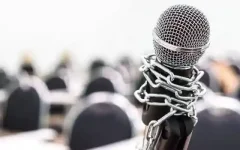Most people know about Blessed Mhlanga facing charges under Section 136 of Zimbabwe's Criminal Law Act. The government claims he sent messages that stir up violence or property damage. His arrest clearly breaks Zimbabwe's Constitution and looks completely unlawful.
Both worldwide human rights agreements and Zimbabwe's laws say reporters must speak freely without limits. Zimbabwe signed the International Covenant on Civil and Political Rights back in 1991. This agreement protects everyone's right to share ideas without anyone stopping them. They also signed the African Charter on Human Rights, which says every person can receive information and share their thoughts legally.
The Zimbabwe Constitution from 2013 clearly states in Section 61 that all citizens have freedom to express themselves. This freedom includes finding, getting, and sharing thoughts with others. Yet reporters face arrest constantly in Zimbabwe. Why does this happen? The country has press freedom laws that officials twist to crush anybody who disagrees with them.
Parts of the Access to Information Act and Criminal Law Act contain rules that officials can stretch to make normal reporting seem criminal. These laws create fear among journalists who worry about legal trouble just for doing their jobs. The government often makes up fake claims like "publishing lies" or "causing violence" to lock up reporters wrongfully.
This awful practice directly attacks free speech and personal safety rights that appear in the Universal Declaration of Human Rights. The story of Hopewell Chin'ono shows how bad things can get. Officials repeatedly jailed him on fake charges when he exposed government corruption. Human rights groups around the world condemned how Zimbabwe treated him.
For twenty years, officials have accused critics of treason, causing violence, and spreading lies just to silence the free press and different opinions. Every reporter must realize how dangerous their job becomes when they question authority figures. Many journalists want to cover the Geza situation fully but stay silent because they fear punishment.
The threat of being charged with supporting rebellion hangs over their heads. This effectively stops them from speaking freely and blocks honest reporting. Zimbabwe calls itself a democracy where the Constitution protects basic rights. Reporters should express their thoughts without censorship or constant watching that forces them to obey and submit.
Both worldwide human rights agreements and Zimbabwe's laws say reporters must speak freely without limits. Zimbabwe signed the International Covenant on Civil and Political Rights back in 1991. This agreement protects everyone's right to share ideas without anyone stopping them. They also signed the African Charter on Human Rights, which says every person can receive information and share their thoughts legally.
The Zimbabwe Constitution from 2013 clearly states in Section 61 that all citizens have freedom to express themselves. This freedom includes finding, getting, and sharing thoughts with others. Yet reporters face arrest constantly in Zimbabwe. Why does this happen? The country has press freedom laws that officials twist to crush anybody who disagrees with them.
Parts of the Access to Information Act and Criminal Law Act contain rules that officials can stretch to make normal reporting seem criminal. These laws create fear among journalists who worry about legal trouble just for doing their jobs. The government often makes up fake claims like "publishing lies" or "causing violence" to lock up reporters wrongfully.
This awful practice directly attacks free speech and personal safety rights that appear in the Universal Declaration of Human Rights. The story of Hopewell Chin'ono shows how bad things can get. Officials repeatedly jailed him on fake charges when he exposed government corruption. Human rights groups around the world condemned how Zimbabwe treated him.
For twenty years, officials have accused critics of treason, causing violence, and spreading lies just to silence the free press and different opinions. Every reporter must realize how dangerous their job becomes when they question authority figures. Many journalists want to cover the Geza situation fully but stay silent because they fear punishment.
The threat of being charged with supporting rebellion hangs over their heads. This effectively stops them from speaking freely and blocks honest reporting. Zimbabwe calls itself a democracy where the Constitution protects basic rights. Reporters should express their thoughts without censorship or constant watching that forces them to obey and submit.












